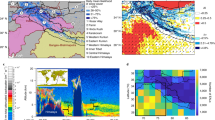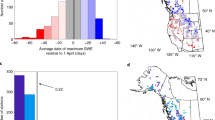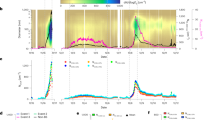Abstract
Heavy metal variations in polar ice cores may reflect changes in global airborne pollution1. Reported profiles from Antarctica1–3 and Greenland4, where sampling resolution was normally larger than a year, have shown a much greater variability than can be reasonably accounted for by variations in the annually smoothed emissions of anthropogenic sources and most natural sources. Volcanism has been invoked4 to account for major features. We now report data from a finely resolved sample sequence from a remote plateau region of the Antarctic Peninsula. Variations of similar magnitude to those reported for longer time series occur also on the scale of seasonal changes and even of single snowfalls; these must be controlled by meteorological processes. We conclude that changes in large-scale transport processes and depositional mechanisms on longer tune scales may have as important a role as emission rates in generating the concentration profiles observed in deeper ice cores.
This is a preview of subscription content, access via your institution
Access options
Subscribe to this journal
Receive 51 print issues and online access
$199.00 per year
only $3.90 per issue
Buy this article
- Purchase on Springer Link
- Instant access to full article PDF
Prices may be subject to local taxes which are calculated during checkout
Similar content being viewed by others
References
Boutron, C. Nature 277, 551–554 (1979).
Boutron, C., Martin, S. & Lorius, C. in Proc. 9th Conf. Atmos. Aerosols, Condensation and Ice Nuclei, Galway, Ireland (Pergamon, New York, 1978).
Boutron, C. J. geophys. Res. 85, 7426–7432 (1980).
Herron, M. M., Langway, C. C., Weiss, H. V. & Cragin, J. H. Geochim. cosmochim. Acta 41, 915–920 (1977).
Landy, M. P. Analyt. chim. Acta 121, 39–49 (1980).
Thompson, L. G. in Proc. UGGI Symp. on Isotopes and Impurities in Snow and Ice (ed. Oeschger, H.) 351–363 (IASH Publ. No. 118, 1977).
Herron, M. M. & Langway, C. C. J. Glaciol. 24, 345–356 (1979).
Boutron, C. thesis, Univ. Grenoble (1978).
Nriagu, J. O. in The Biogeochemistry of Lead in the Environment, Part A (ed. Nriagu, J. O.) 155–161 (Elsevier, Amsterdam, 1978).
Duce, R. A., Hoffman, G. L. & Zoller, W. H. Science 187, 59–61 (1975).
Beauford, W., Barber, J. & Baringer, A. R. Science 195, 571–573 (1975).
Hamilton, W. L. & O'Kelly, M. E. Antarctic Res. Ser. 16, 355–362 (1971).
Thompson, E. M. & Thompson, L. G. Antarctic J. U.S. 136–137 (1977).
Taylor, S. R. Geochim. cosmochim. Acta 28, 1273–1285 (1964).
Boutron, C. & Martin, S. Analyt. Chem. 51, 140–145 (1979).
Author information
Authors and Affiliations
Rights and permissions
About this article
Cite this article
Landy, M., Peel, D. Short-term fluctuations in heavy metal concentrations in Antarctic snow. Nature 291, 144–146 (1981). https://doi.org/10.1038/291144a0
Received:
Accepted:
Issue Date:
DOI: https://doi.org/10.1038/291144a0
This article is cited by
-
Determination of heavy metals at the pg/g level in Antarctic snow with DPASV and IDMS
Fresenius Zeitschrift f�r Analytische Chemie (1988)
-
The record of global pollution in polar snow and ice
Nature (1985)
Comments
By submitting a comment you agree to abide by our Terms and Community Guidelines. If you find something abusive or that does not comply with our terms or guidelines please flag it as inappropriate.



